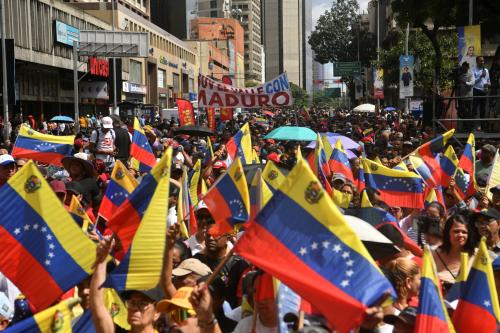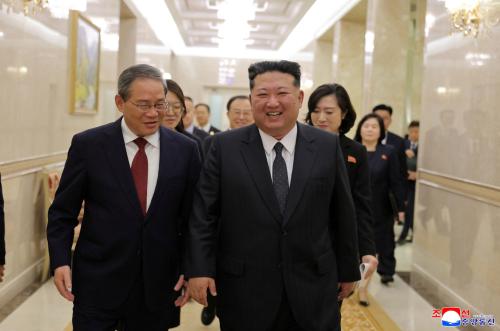President Donald Trump and North Korean leader Kim Jong Un met in Hanoi, Vietnam, on February 27 and 28 for their second summit to focus on denuclearization and sanctions relief. The two leaders left their first summit last June in Singapore with a vague joint statement about denuclearization, sanctions relief, and other matters.
On March 6, the Center for East Asia Policy Studies at Brookings hosted a distinguished panel of experts to analyze the outcomes of the second summit, address the future of U.S.-North Korea relations, and propose policy recommendations.
North Korea’s approach to Hanoi
Event moderator Major Garrett, the chief Washington correspondent for CBS News, began the discussion by sharing observations he made while in Hanoi, including that senior officials in the Trump administration did not offer any comments to the travelling press corps after the conference, summit planning appeared haphazard, Kim Jong Un publicly answered a question from David Nakamura of the Washington Post, and officials on both sides created unrealistic expectations.
Some of the expert panelists remarked that Kim Jong Un appeared more confident in his public diplomacy skills than he did in the previous summit, the North Korean leader utilized his knowledge of how to appeal to Trump to influence him during the negotiations, and the meeting illustrated that North Korea cares primarily about sanctions relief.
Jung Pak, senior fellow and SK-Korea Foundation Chair in Korea Studies, said that although Kim “probably felt that he was in a warm, receptive environment” with the U.S. president, he “also miscalculated in thinking that, like President Trump, he could—through the sheer force of his personality and of that relationship—get this big deal going.”
The U.S. approach
Robert Einhorn, senior fellow with the Arms Control and Non-Proliferation Initiative at Brookings, explained that the North Koreans sought a lifting of the most consequential U.N. Security Council sanctions in return for shutting down all—or the majority—of the Yongbyon nuclear complex. He noted that the United States essentially came back with its original demands: complete, rapid denuclearization by North Korea.
According to Einhorn, the United States should have “sweetened” the deal by leveraging options outside of lifting sanctions (e.g., establishing liaison offices in capitals, a declaration to end the Korean War, and humanitarian assistance). Additionally, he suggested, “an interim agreement that suspends all production of fissile material anywhere in North Korea and links that to a formalization of the current suspension of all nuclear weapon tests and all flight tests of long-range missiles.” By examining more “reasonable” steps such as these, perhaps another stalemate could have been avoided, Einhorn added.
A failure in process
Why didn’t the leaders make any progress? Kathleen Stephens, president and CEO of the Korea Economic Institute of America and former U.S. ambassador to the Republic of Korea, said that “there may have been a miscalculation on both sides about how badly the other one wanted a deal, but I think they sacrificed a small deal for walking away … it’s a freeze for a freeze by another name.” She noted that “a failure of process,” including lack of time and preparation, and the Trump administration’s “accommodationist” stance, contributed to the minimal results.
Behind President Trump’s diplomacy
The scholars also discussed Otto Warmbier and President Trump’s response to the news of his death, the divisions within the Trump administration that make reaching the goal of total denuclearization of North Korea difficult, and the potential need to bring in outside voices (e.g., China, South Korea, Japan) to “depersonalize” U.S.-North Korea tensions in this debate moving forward.
Thomas Wright, senior fellow and director of the Center on the United States and Europe, spoke about the motivations behind Trump’s stances, noting that the president tends to base his views and decisions on whether or not he is getting along with the other party. As Wright said, “I think he is essentially … a ‘short-termist.’ His view is, ‘if this isn’t a problem on my watch, then it’s not a problem.’” Trump did not implicate North Korea in Otto Warmbier’s death as he had in the past, which points to larger diplomatic gaps where the president is willing to tolerate inappropriate behaviors in exchange for solid relations.
Mimi Cottingham contributed to this post.
The Brookings Institution is committed to quality, independence, and impact.
We are supported by a diverse array of funders. In line with our values and policies, each Brookings publication represents the sole views of its author(s).





Commentary
Are US-North Korea relations at a stalemate? Experts discuss
March 15, 2019